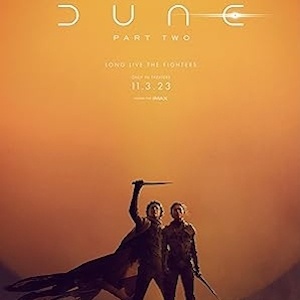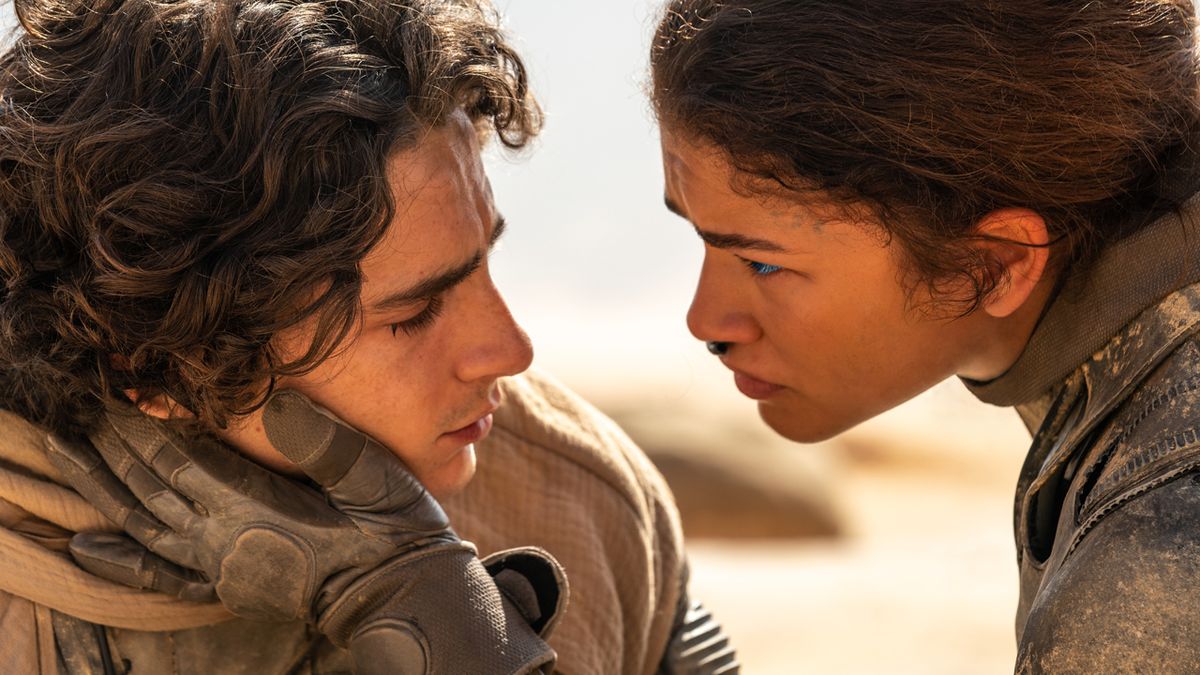I have read all of Frank Herbert’s DUNE books many times, and a few that were written by his son Brian. I can unequivocally say that the DUNE is my favorite science fiction series. The depth of the universe that Herbert creates is rivaled only by Tolkien’s Lord of the Rings. This is why it is so hard to recreate DUNE for the screen. If I had a choice, I would have preferred that DUNE were created as a streaming mini-series that could have taken as much time as needed to tell the story. The visuals and music may not have been as spectacular as what Denis Villeneuve was able to pull off, but the story could have explored the depths of the characters and plot much more deeply.
What I love about the movie
What I love most about Denis Villeneuve’s DUNE is the visuals. The mood Villeneuve creates with his cinematic eye provides hints into the depth of the story that cannot be told through dialog or acting. Arrakis, the planet DUNE, is a character in the book, and Villeneuve treats it as such. I think I might agree with someone who said that Arrakis is the best-developed character in the movie.
Join the PERA (Personal Entertainment Research Assistant) waitlist.
The World's Most Indispensable Movie App
The RunPee app tells you the best times to
run & pee during a movie
so you don't miss the best scenes.
Download the RunPee app.
100% free (donation supported)
Every actor performs magnificently. Of course, the actors deserve credit for their talent, but I believe that the only way to get great acting from an entire cast is through great script and great direction.
What I dislike about the movie
I’m not one who thinks that any movie based on a book should try to be completely faithful to the source material. Each medium should stand on its own. That being said, some things are changed in the movie that I don’t think transfer. The most glaring is that Gurney Halleck was convinced that Lady Jessica was the traitor and not Dr. Yueh. That was instrumental to the motivation for Paul to take the water of life. Speaking of which, in the book, Lady Jessica did not want her son to take the water of life. For that matter, neither did Paul. It was only done after much trepidation. This plot line is completely removed from the movie. The Harkonnens launch an attack on Sietch Tabr and destroy it; Paul says, “Well, I didn’t see that coming. I guess I should take the water of life so that I can see the future more clearly.” That’s about how glibbly the movie treats it, whereas in the book it’s a crucial decision that has enormous repercussions.
What people are saying
about the RunPee app.
Brilliant idea with great information
I’ve been using RunPee for a few years now and it’s basically a requirement of going to the movies for me. The best part of course are the “pee times” that give you cues, synopses and times for when you can pee without missing the most important parts of the movie. There is also information about the credits- length, extras and if there are any extra scenes at the wayyy end. Super helpful to just know that it is or isn’t worth staying. There is a timer function that will buzz your phone when it’s a good time to pee. I also appreciate that the app is very conscientious about it being an app you use in a theater- dark background, all silent alarms etc. I will always enjoy the experience of the theater even if I could watch things at home- but I’ve even used it at home to check for things like after credit scenes or other information too.
View all reviews
Apple App Store | Google Play Store
Download RunPee app
Also, Alia is born in the book and she’s the one who kills the Baron. The events in the movie are massively compressed as compared to the book. The events in the book span about four years. The events in the movie are compressed into less than nine months since Jessica is pregnant when she arrives on Arrakis and Alia is yet to be born by the end.
I’m also not sure what to think of the changes made to Chani and the relationship between Paul and Chani. On the one hand, I like that Chani has more agency in the book. That works well for the story, but now I’m unsure how they will make amends without diminishing Chani’s agency. Villeneuve has said that he is already working on the script for Dune Messiah and so Paul and Chani will have to have a reconciliation before they can actually have children. I’m going to guess that the third movie will pick up a number of years into the future, just as the book does. But to have Paul and Chani fix things off-screen now would be weak sauce.
I wish more details were given to the motivations of the characters. As I mentioned earlier, Frank Herbert created a detailed universe filled with conflict and did a masterful job of putting his characters in situations where they were forced to make sacrifices. Paul did not want to be the Kwisatz Haderach. He only chose that path as a last resort. The movie expressed his fear of taking the water of life, but the motivation for taking that risk wasn’t sufficiently expressed in the movie.
Conclusion
I’m glad that Villeneuve took on the daunting task of making DUNE. It’s hard to be critical given the constraints of cramming twenty hours of material into the five hours of DUNE 1&2. The visuals and music are masterpieces. With any hope, this will inspire someone else to tackle the source material someday and give it the proper attention to detail it requires.
Grade: B
About The Peetimes: I think the first two Peetimes are the best, but none of them are bad. The only issue is with the fourth Peetime; there is an important scene that begins as the Peetime ends that you don’t want to miss.
There are no extra scenes during, or after, the end credits of Dune: Part Two.
| Rated: | (PG-13) Sequences of Strong Violence | Brief Strong Language | Some Suggestive Material |
| Genres: | Action, Adventure, Drama |
| Starring: | Florence Pugh, Timothée Chalamet, Rebecca Ferguson |
| Director: | Denis Villeneuve |
| Writer(s): | Denis Villeneuve, Jon Spaihts, Frank Herbert |
| Language: | English |
| Country: | United States, Canada |
Plot
Duke Paul Atreides joins the Fremen and begins a spiritual and martial journey to become Muad’dib, while trying to prevent the horrible but inevitable future he’s witnessed: a Holy War in his name, spreading throughout the known universe.
Creator and developer of the RunPee app. When something doesn’t work right in the app it’s pretty much his fault. 🙂
Aspiring author. Would like to finish his “Zombie Revelations” trilogy if he could break away for working on RunPee and the cottage he’s building for RunPee Mom.







I seem to find myself rereading Dune annually. It’s just so easy and enjoyable to read about the interesting cultural dynamics we move through and among in the story. I like the Great Houses and their dynamics: it’s such a great deep dive into a futuristic feudal society, which sounds like an oxymoron…but as you read it’s clear why this is so: to prevent another war against thinking machines. So their culture is based around human skills that approach AI levels of computing, with the added bonus of creativity and unpredictability. Add in the mysticism of the Bene Gesserit, the OC Bible, and the Navigators, and you get swept up in the magnificent world building. Grandeur aside, none of this would matter to me if the characters weren’t written so well, with such personality. By the time Leto saves the men from the sand crawler, I am in love with the Duke. I remember trembling with Paul and the Box of Pain, and feeling for Jessica as she sobs outside the door in fear for her son. I have the Litany Against Fear on a note in my wallet.
And then there’s the Fremen society, after the exciting escape and flight sequences across the desert. The Fremen underworld is the real beating heart of the book, and all the high society banquets and machinations become relegated to the background. I love their dedication to a an ecological future none of them will ever see, their immense respect for the great worms, and how these people have adapted to harsh conditions in a way that becomes spiritual. But again, I favor this because the characters are so interesting. Stilgar is a highlight, and then Gurney as he reunites: “You young pup!” Ah, my heart. <3
There’s just enough worm time to keep them exciting: they are no longer daunting once we become a rider with Paul, but still magnificent creatures and a prime example of worthy stewardship and husbandry.
Then there’s the whole scope of prescience that consumes Herbert throughout his series. I can’t think of another sci fi or fantasy world that handles this so adeptly. Marion Zimmer Bradley in her Darkover novels definitely has a culture based on mysticism and a caste of psi-adepts. Both authors were contemporaries, so maybe this was a big topic at the time. In any case, I think about Paul’s rejection versus Leto II’s ultimate acceptance of destiny. I really think about it a great deal. Just like I think about the choices in Stranger in a Strange Land a lot: again, deeply philosophical topics, but hooked onto great characters I care about.
All this is to say I don’t think we are quite there yet in the Dune adaptations. Denis V is so spare with his dialog, as an artistic choice. DUNE is spectacular and ultimately non offensive, but I miss the charm and wit woven through the novel. We see a lot of that in the miniseries, which really tried hard to stick to the best of the books. Lynch abandoned the books and went in another direction, but captured more of the galaxy’s sense of oppression and stagnation.
Denis seems to want to make each screen moment from the eyes of an artist: he seems very painterly to me. I respect that. It’s nice to see his work from that view. But I don’t feel very connected to the characters aside from my abiding love for them imported from the books.
Agreed all around.
It would be interesting to break down the number of words used to describe characters in the book Dune. I would wager that Paul will get the most, but the planet Arrakis probably comes in second. Herbert treated the planet as a character. None of the film adaptations have pulled that off.
Comments are closed.